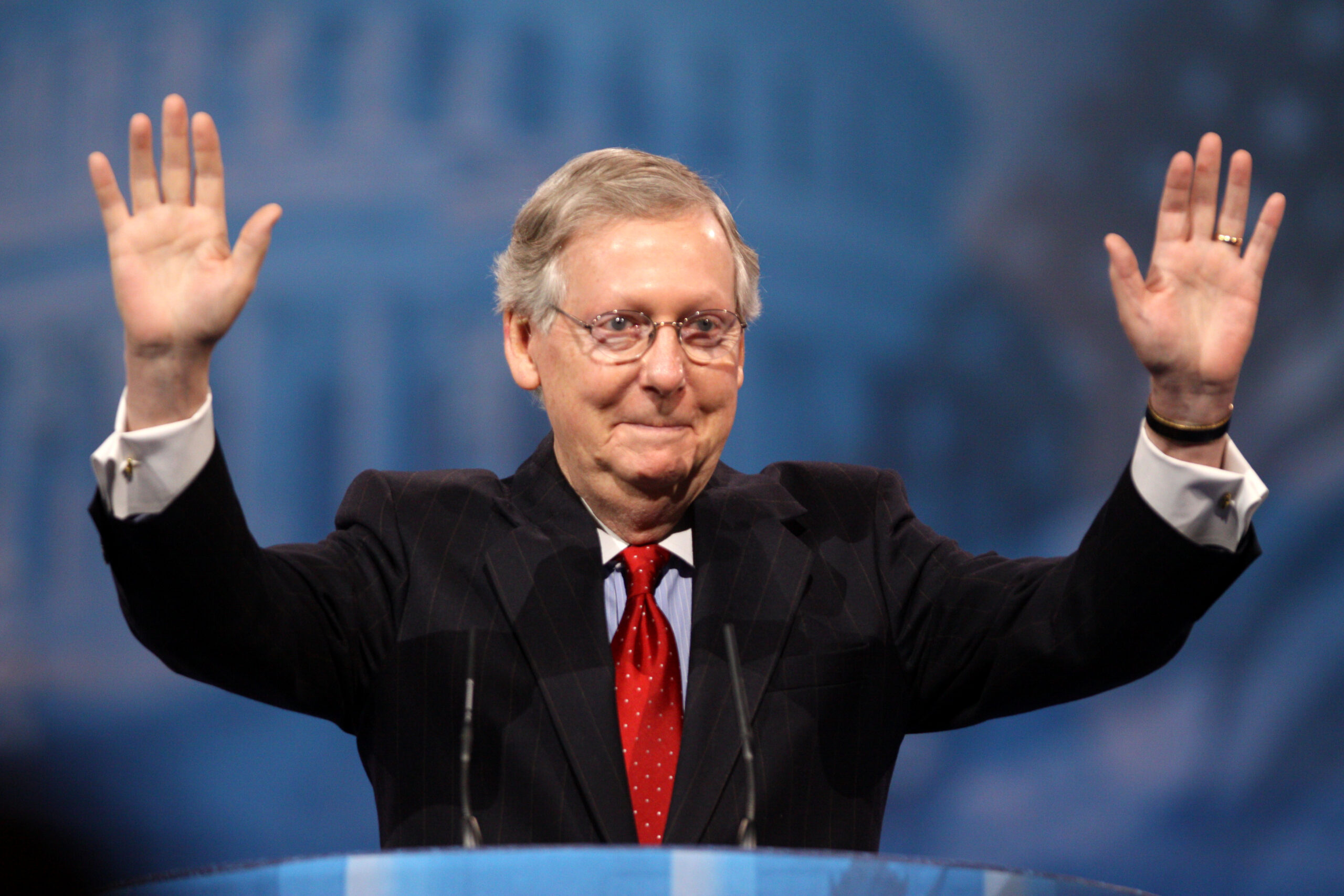He was doing a bob-and-weave with reporters — seeking not to repeat supportive remarks he made about Representative Liz Cheney last winter — when Senate Republican Leader Mitch McConnell spoke unsettling words, four times in a row:
“One hundred percent of my focus is on stopping this new administration… I think the best way to look at what this new administration – the president may have won the nomination, but Bernie Sanders won the argument.”
The words were eerily reminiscent of what McConnell told the National Journal in a 2010 interview: “The single most important thing we want to achieve is for President Obama to be a one-term president.”
McConnell is not about governing. He evinces no interest in taking the hand dealt by America’s voters and trying to solve or get a jump on the nation’s problems. He is instead about power, hanging onto his position as a top Republican, maintaining (now regaining) a Republican majority in the Senate, and blocking the other side’s initiatives… even in time of national crisis.
One of the best presidents America never had, two-time Democratic presidential nominee Adlai Stevenson, put it succinctly when he said: “The ability to govern is the acid test of politics, the acid, final test.”
An example of failing the test: On Wednesday, Americans marked the National Day of Awareness for Missing and Murdered Indigenous Women.
The day came and went as House passed legislation, renewing the 1994 Violence Against Women Act – authored by then-Senator Joe Biden – continues to languish in the United States Senate.
Senate Republicans allowed VAWA’s authorization to expire two years ago.

They objected to provisions of a bipartisan House bill that extended protection to LGBTQ+ and Native American victims and contained a “boyfriend provision” prohibiting firearms ownership by a person convicted of assaulting a woman he was dating.
As Yogi Berra would say, it’s déjà vu all over again in 2021.
The House has passed legislation, again on a bipartisan vote.
It languishes in the Senate. As in 2019, Republicans say they are coming up with an alternative, but no such alternative has surfaced.
The House bill again contains a strengthening provision, a prohibition against distributing sexually explicit images without a woman’s consent.
With control of his caucus, McConnell could have worked out a proposal, taken it to the Democrats – Senator Patty Murray, D‑Washington, is active on the issue – gone into conference with House Democrats, and reauthorized an important, workable piece of legislation… one that works to shield poor and Indigenous women. In the McConnell worldview, however, there’s nothing in it for him.
The Republicans’ strategy in 2009, largely arrived at during a dinner on Obama’s inauguration day, was of obstruction, broadly deployed.
Obama had promised: “We have a chance to bring the country together in a new majority.” Senate Republicans would have none of it.
In his candid and telling book – one ex-president’s memoir written by the ex-president – Obama explained at length how his administration was snookered.
He scaled back the American Recovery and Reinvestment Act of 2009 (ARRA), but succeeded in harvesting just two Republican Senate votes. In turn, benefits from the ARRA recovery package were slow to kick in and the Recession lasted past the 2010 mid-term elections, which gave Democrats a “shellacking.”
Senate Finance Committee Chair Max Baucus wasted months trying to compromise with Republicans on healthcare. As described by Obama, the scene was a political equivalent of the “Peanuts” sketch in which Lucy promised to hold the football, then jerked it in the air as Linus tried to kick.
The House passed energy reform legislation – then-Representative Jay Inslee helped round up Rust Belt support – only to see a repeat performance.
Senator John Kerry tried to work out bipartisan accord with a slippery Senator Lindsay Graham, R‑South Carolina, only to be thwarted.
Blockage and bait-and-switch tactics, deployed by McConnell, have hurt the country. Climate damage is not just melting polar ice caps and causing sea levels to rise, but inflicting severe weather on the American southeast, droughts and fire on the American West. In an era of rising income inequality, the Great Recession and COVID-19 pandemic have hit hard at poor and lower-middle class Americans.
A lot of them live in Kentucky.
Again, however, McConnell’s self-interests lie elsewhere.
He is wealthy, having married money.
The Republicans’ 2017 tax legislation, which he masterminded, yielded ninety percent of its benefits to the upper ten percent of income earners. Its corporate tax cuts enriched donors to McConnell’s political action committees. Being the distributor of campaign cash is a key to his longevity as Senate Republican Leader.
As a young man, McConnell once worked for a civil rights-minded Republican, Kentucky Senator John Sherman Cooper. Any idealism left him long ago.
He stayed the course of power despite private revulsion at Donald Trump, and legislatively served as Trump’s enabler. And he has demonstrated how power is wielded in America. McConnell told the New York Times that blocking Merrick Garland’s 2016 nomination to the U.S. Supreme Court was “the most important thing I have ever done.” Four years later, McConnell would ram through Trump’s pre-election nomination of Amy Comey Barrett in a few weeks’ time.
“If there’s any power in this job, really — it’s the power to schedule, to decide what you’re going to do or not do,” McConnell once told the New York Times. In recent years, that power has been to decide what the country would not do.
Which brings us to Joe Biden.
The new administration has vowed not to get snookered.
Yet, in responding to McConnell’s “one hundred percent” remark, Biden said Wednesday: “Look, he said that in our last administration (with) Barack (Obama) he was going to stop everything – and I was able to get a lot done with him.”
Like what? Wide-awake Joe should not be fooling himself.
Gone are the days when Democratic presidents could negotiate a federal minimum wage increase with a Republican Senate leader (and vice versa).
The shrinking Republican base is in no mood for society’s compromises.
Nor is McConnell, set on regaining his post as Senate Majority Leader in the 2022 midterm elections. Twenty-four years of serving in the Senate with McConnell ought to be instructive: Never expect Mitch to have your back.

